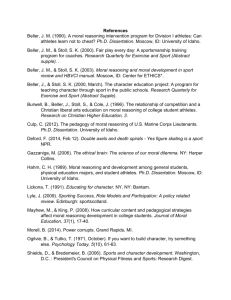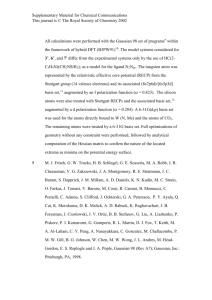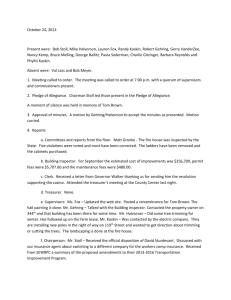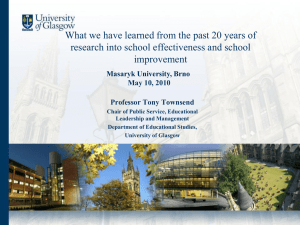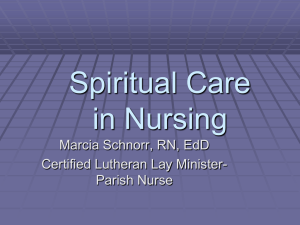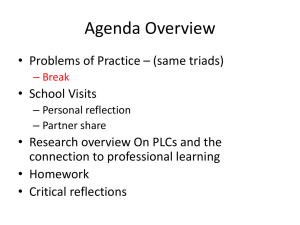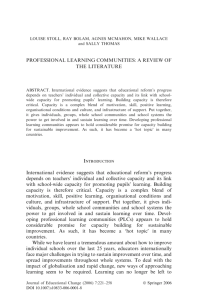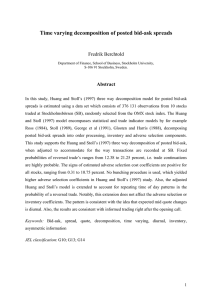cyberspace under siege - Harvard Kennedy School
advertisement
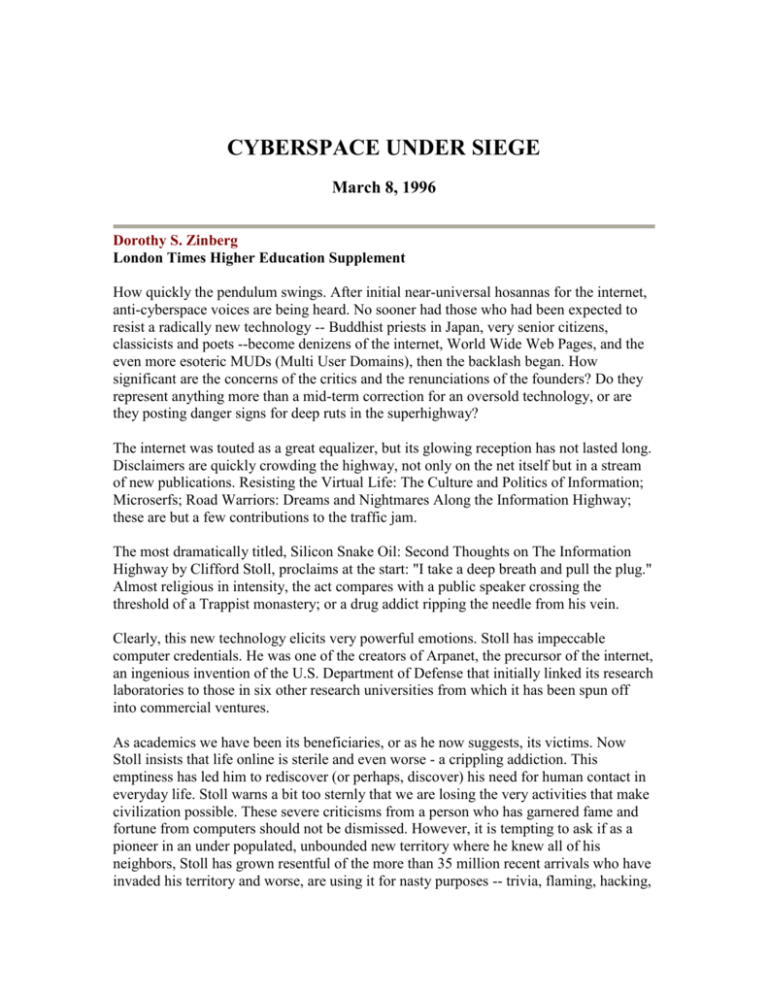
CYBERSPACE UNDER SIEGE March 8, 1996 Dorothy S. Zinberg London Times Higher Education Supplement How quickly the pendulum swings. After initial near-universal hosannas for the internet, anti-cyberspace voices are being heard. No sooner had those who had been expected to resist a radically new technology -- Buddhist priests in Japan, very senior citizens, classicists and poets --become denizens of the internet, World Wide Web Pages, and the even more esoteric MUDs (Multi User Domains), then the backlash began. How significant are the concerns of the critics and the renunciations of the founders? Do they represent anything more than a mid-term correction for an oversold technology, or are they posting danger signs for deep ruts in the superhighway? The internet was touted as a great equalizer, but its glowing reception has not lasted long. Disclaimers are quickly crowding the highway, not only on the net itself but in a stream of new publications. Resisting the Virtual Life: The Culture and Politics of Information; Microserfs; Road Warriors: Dreams and Nightmares Along the Information Highway; these are but a few contributions to the traffic jam. The most dramatically titled, Silicon Snake Oil: Second Thoughts on The Information Highway by Clifford Stoll, proclaims at the start: "I take a deep breath and pull the plug." Almost religious in intensity, the act compares with a public speaker crossing the threshold of a Trappist monastery; or a drug addict ripping the needle from his vein. Clearly, this new technology elicits very powerful emotions. Stoll has impeccable computer credentials. He was one of the creators of Arpanet, the precursor of the internet, an ingenious invention of the U.S. Department of Defense that initially linked its research laboratories to those in six other research universities from which it has been spun off into commercial ventures. As academics we have been its beneficiaries, or as he now suggests, its victims. Now Stoll insists that life online is sterile and even worse - a crippling addiction. This emptiness has led him to rediscover (or perhaps, discover) his need for human contact in everyday life. Stoll warns a bit too sternly that we are losing the very activities that make civilization possible. These severe criticisms from a person who has garnered fame and fortune from computers should not be dismissed. However, it is tempting to ask if as a pioneer in an under populated, unbounded new territory where he knew all of his neighbors, Stoll has grown resentful of the more than 35 million recent arrivals who have invaded his territory and worse, are using it for nasty purposes -- trivia, flaming, hacking, pornography, fraud, even 'virtual adultery' and cyber-rape -- largely unanticipated by its progenitors. International spying by the KGB and Communist nations was expected during the Cold War ö after all the Defense Department had set up Arpanet to decentralize national security data so that its security network would be invulnerable even to even a nuclear blast. But nastiness and theft -- the infringement of intellectual property rights having ballooned into an almost insuperable problem ö- and the utter banality of much on the internet, were not clearly foreseen. In his first, best-selling book, The Cuckoo's Egg, Stoll vividly detailed how from a computer base in Berkeley, California he was able to track down a group of German hackers who were breaking into computers and selling their discoveries to the Soviet KGB. To give the story line a jolt, he reported that the definitive signal came through on his pager, while he was in the shower with his girlfriend. Today he complains more about the junk that litters the highway along with the undesirable - he moans morons and creeps are omnipresent, and rudeness as well as outright aggression are rampant. Unable to give vent to their rage elsewhere, he asserts, "flamers" pick fights and hurl insults, all the while hiding behind their anonymity. The allure of new "virtual communities", Stoll believes, reflects the sad fact of the disappearance of real communities. By the time he wrote Silicon Snake Oil, Stoll had opted to make use of his neighborhood library instead of spending hours looking for sources. Dinners with real friends had become more pleasurable than hours spent roving in cyberspace attempting to make contact with other ephemeral, like-minded spirits. For the time being, he has become a proselytizer for the simple life. Others worry about the fate of the printed word. Not surprisingly one of the most articulate is Vartan Gregorian, formerly director of the New York Public Library, now president of Brown University, and an energetic champion of books. He despairs for the libraries that are 'the DNA of our civilization.' The library embodies the book, but will the library survive if the book finds its home in electronic space? Convincingly he argues that "Going from books to computers is no mere change of medium." It is a revolution on a par with the appearance of the first printed book. Enumerating the gains accruing from this "dazzling equipment", he nevertheless cautions academics against the new "priesthoods and esoteric communities" emerging in a "small,self-confirming world of theory, technique and methodology." Gregorian argues that the worst aspects of urban life are being recreated where people retreat into their own enclaves safe from encounters with those whose opinions and needs are different from their own. The cozy clubs unwittingly designed to keep "others" out, are precisely the opposite of the global village promised by cyberspace communicants. The list of warnings grows rapidly. A grammar school teacher observes that her students, happily anonymous on the Internet, are not learning the social manners or discourse of everyday real life. Signs are beginning to emerge that young people whose major contacts are on the 'net' do not acquire the ability to socialize comfortably with real people. Traditional gender bias on the net is as easy to identify as is racial and socio-economic discrimination. Sadly, the new technology has fulfilled the prophecy that large-scale unemployment would result from ever-more efficient machines, although more recent statistics suggest that new jobs are being created at a rapid rate. A recent addition to Cassandra's list does little to diminish the angst of the anti-voices. A respected researcher, Dennis Hayes, reports that information technology has brought about 'an epidemic of chronic, often crippling, workplace injuries and layoffs.' He reports that repetitive strain injuries and cumulative trauma disorders account for some 63% of commonly reported workplace injuries and he cites the staggering sum of $25 billion per year that is spent on 'litigating, treating, retraining, and replacing the computer-injured.' In addition, he argues, productivity has not increased. The most serious threat to life and limb, however, has been revealed in a newlydeclassified report from the Department of Defense. The Internet is vulnerable to terrorists and hackers who can virtually bring society to a standstill. "Cyber-terrorism" is inevitable according to the report's authors, through the use of weapons of mass disruption." Despite the gloomy predictions, the Internet is here to stay. Like the telephone, the automobile, and the airplane, the technology is radically changing society. The opportunities it presents are much in evidence. Stoll, along with other justifiably anxious renunciants, should apply their expertise to creating guidelines for public policies that match the technologies they know so well. And perhaps Mr. Stoll should strive for moderation. Rather than pulling the plug, he might just have a quiet drink and settle down in front of the screen from time to time --very helpful in finding the location of a favorite book in the local library. He and his colleagues are going to have to read a lot of them to be able to design the technology for keeping the cyber villains at bay. The rest of us have an equally difficult task -- to create policies for the public good in the real and virtual future.
